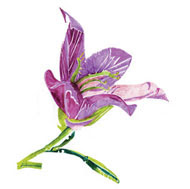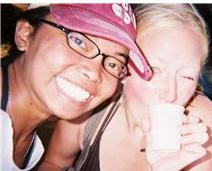The Homesick Restaurant
Published: November 28, 2008
In March this year I telephoned a friend in Pakistan and asked him to pick a bowl’s worth of flower buds from the kachnar tree in his garden. They appear only at that time of year. He was to put them in the freezer until I visited from England sometime at the end of April or the beginning of May. Each beautiful leaf of the kachnar tree resembles a child’s drawing of an apple, and the large blossoms are a deep pink striped with white, though they can be completely white also. The buds are seldom given the chance to open, however, as they are harvested to be cooked soon after they form. The kachnar flower buds are a great delicacy in Pakistan, a delicacy unavailable in England, and it is one of the things I miss most about Pakistan.
My brother and sister were visiting with me at the time, and an hour or so after my phone call to Pakistan, we went out for a meal. The restaurant we chose, more or less at random, was staffed by Pakistanis — one of the countless such places in the London area that are referred to by the white clientele as Indian. I hadn’t been living in this particular neighborhood for long, but I felt sure that most of the waiters had only just arrived in England from small towns and villages in Pakistan. They often come after having marriages arranged to British-born Pakistani girls. They have little or no English and little choice except working in restaurants or driving taxis. A lot of such men do manual labor at a nearby factory that the British-born Pakistani teenagers call “the factory of the newlyweds.”
We ordered. As always, my brother, my sister and I searched the food that evening for our mother, for our aunts and for our grandmothers. Each Pakistani woman spices her curries in her own way; each pan has a different aroma, the way each human body smells slightly different. The thickness, texture and the width of each woman’s chapati is also unique to her, depending on the size of her hands, the shape of her fingers and the strength with which she kneads the dough. And that evening all three of us were overcome very soon after we began the meal: the food — the flavor of the mutton, of the samosas — was the best we had tasted since our visits to our eldest aunt’s home in Lahore. That was 20 years ago, and the aunt had been dead for 10 years.
We reminisced as we ate, each new mouthful sending us deeper into our memories. We talked about how my aunt used to dye her hair a bright orange with henna, something that made us smile when we came to live in England as teenagers, where only punks dyed their hair that color. She was the best cook in the family, but she could be bad-tempered at times. Her husband, our uncle, was gentle and kind but impractical and a dreamer, like all his brothers, including our own father. The uncle had, for example, taken his children out of what was arguably the best school in the city and enrolled them in one that had very poor standards — but it was owned by a friend of his and was threatened with closure because there were not enough pupils on the register.
“This is too incredible,” I said, pushing the small steel wok of spinach and fenugreek across the table toward my sister. “How did the cook learn to do all this?”
My brother raised his hand for the waiter, and when he arrived, my brother asked: “Who is your cook, please? Would it be possible for us to talk to him?”
“It’s not a man,” he replied. “It’s a woman.”
We three looked at one another. The kitchen workers in these restaurants are almost invariably male.
My sister put down her fork and rose from her chair without a word. She went into the kitchen with the waiter, and then my brother and I heard her give a small shout. We rushed to the kitchen and found her in the arms of our cousin — the eldest daughter of our dead aunt.
We learned that she and two of her brothers were living illegally in England — having arrived in the country hidden in a shipment of Christmas trees via France back in December. They hadn’t contacted us or our parents because they were too ashamed of their circumstances, preferring to wait until they had managed to get a foothold in England. They were also concerned that we might get into trouble for harboring illegal immigrants.
We left after a while but went back for her at 2:30 a.m., when the restaurant closed. She took us to her place, and we stayed up talking until her two brothers, our cousins, who were out driving taxis, came back at around 4 a.m., and then there was more talk. It was almost dawn when we took our leave. At one point our beautiful cousin smiled sadly and said: “Come back this evening. Someone brought me a bagful of kachnar flower buds from Pakistan yesterday. I’ll cook them for us.”


Inga kommentarer:
Skicka en kommentar